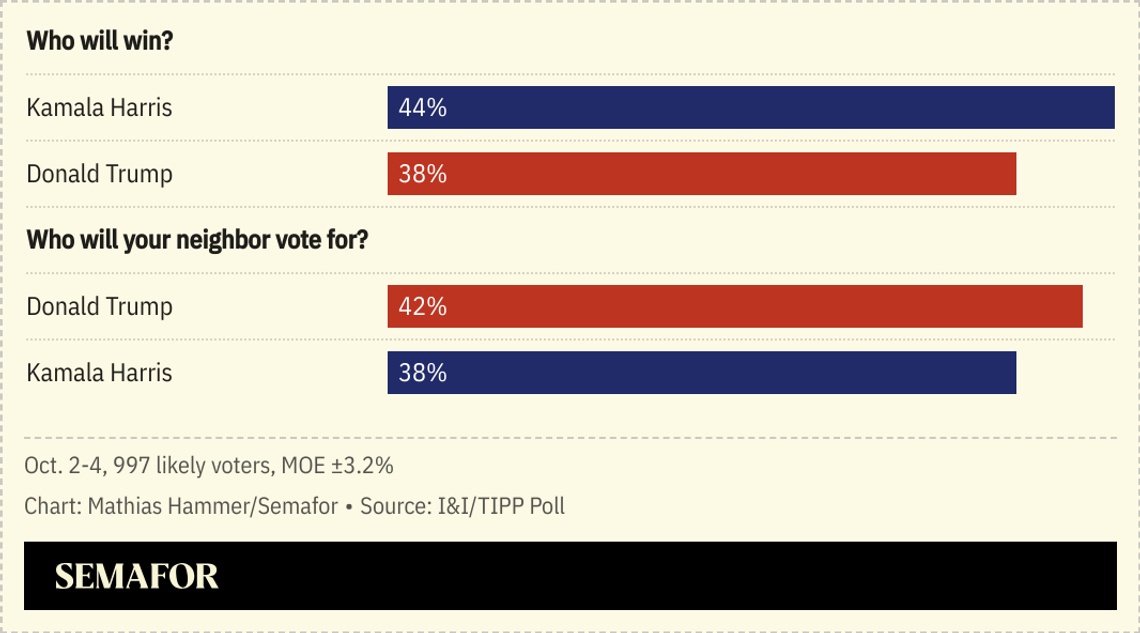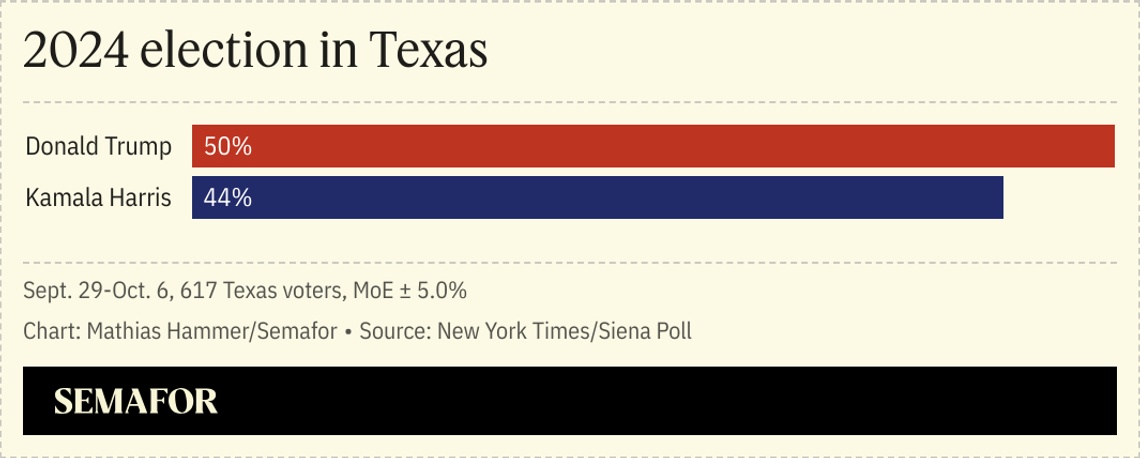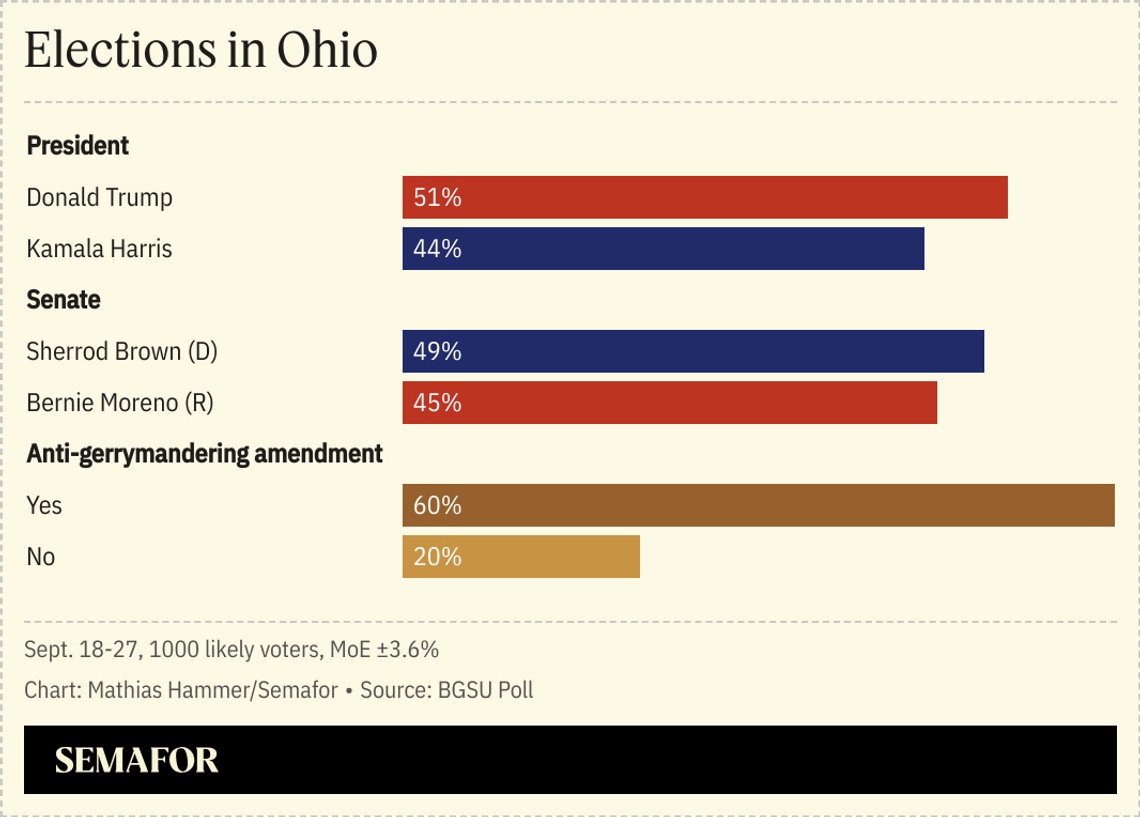 Polls Asking voters who they think will win an election: It’s enlightening, but it doesn’t always mean much. According to CBS News’s polling, most voters spent 2016 expecting Hillary Clinton to win. According to Monmouth’s polling, a slight plurality of voters expected a Trump victory in September 2020 even as the same respondents gave Joe Biden a solid lead in the horse race numbers. Harris has held an advantage every time the question gets asked this year — in this case, in a poll that finds a small single-digit lead for her in the popular vote. But more voters think their neighbors will vote for Trump. What explains it? For the first time, the Democratic nominee against Trump is drawing huge crowds, which Clinton couldn’t in 2016, and Biden didn’t try to in 2020. The perception that Harris will win is annoying enough to some Trump allies that they’ve urged people to watch betting markets, where Elon Musk’s encouragement led to more people buying Trump, putting him ahead.  Here’s the short story of modern Democratic ambitions in Texas. In 2016, Hillary Clinton outperformed a generation of Democrats in the state’s biggest cities and suburbs and lost by single digits. In 2020, Joe Biden did even better in Texas’s population centers, but declined with Latino voters in the Rio Grande Valley. In 2024, the most ambitious Democrats just want a result close enough to ease Colin Allred’s path in the Senate race. Harris is looking more like Biden than Clinton, running 10 points ahead of her with white voters and dominating among college-educated voters. She runs out of road because she barely wins Latino voters, by 6 points, a 21-point decline from Clinton.  JD Vance’s 2022 Senate race gave Republicans an expensive but effective playbook for this year. Vance trailed all summer and moved ahead after Labor Day, once a messy primary was forgotten and Republican groups began outspending Democrats. Moreno, who sailed through his primary, has got more allies making more ad reservations than Vance ever did, including $30 million in spending from the pro-Moreno crypto industry super PAC Fairshake. But Moreno continues to underperform with independents. (One possible factor here: The generic Fairshake ads about jobs aren’t very memorable.) The Democrat-backed redistricting initiative is succeeding because those same independents support it, and because Republicans haven’t broken hard against it. Ads @DonaldJTrumpforPresident/YouTube @DonaldJTrumpforPresident/YouTube- Harris for President, “Big Family.” The Alabama Supreme Court’s ruling that temporarily halted IVF treatments spurred a Republican panic — a quickly-passed state bill to clarify IVF’s legality, a surprise Trump promise for government-backed free IVF at the national level. Democrats didn’t stop talking about the topic, and recruited Latorya Beasley, one of the Alabamian women blocked from an IVF appointment after the decision. She joined Democrats at this year’s State of the Union, and she blames the GOP squarely for what happened to her: “Donald Trump overturning Roe v. Wade stopped us from getting the family we wanted.” Democratic ads about abortion rights tend to star women who want families, and the IVF topic has given them the strongest material.
- Donald Trump for President 2024, “Unbelievable.” Last month, Trump became the first major party presidential nominee to run an ad attacking his opponent on trans rights. This is the second ad on that theme, recapping the story of Shiloh Heavenly Quine, a convicted murder in California who, shortly before Trump took office, became the first American inmate to get state-funded sex-reassignment surgery. “The power that I had — I used it in a way that was about pushing forward the movement, frankly,” Harris says in a clip from a 2019 candidate sit-down hosted by the National Center for Transgender Equality.
- Randy Niemeyer for Congress, “Fight for Working People.” Northwest Indiana has been trending right for years, but Republicans failed to dislodge Democratic Rep. Frank Mrvan two years ago; Donald Trump got 45% of the vote in Mrvan’s 1st Congressional District, and their nominee only improved on that by two points. This year’s GOP nominee leaves the party out of this spot, promising to “lower costs” and “protect workers” from “bad trade deals” against a “career politician” who’s “never worked a real job.” (Mrvan started his political career as a township trustee in 2005; Niemeyer won his first race in 2010.)
ScoopedThe world needed a comprehensive story about Fairshake, the super PAC funded by the cryptocurrency industry to help potential friends and beat potential enemies. Charles Duhigg’s profile in the New Yorker beat everyone to it, with the sort of reporting details that you need to show up for. During Donald Trump’s speech to the Bitcoin Conference, completing his 180 spin from crypto critic to crusader: “A man standing near me FaceTimed his wife and insisted that she watch the speech, even though she was in the delivery room where their grandchild was being born.” Next - 28 days until the 2024 presidential election
- 70 days until the Electoral College votes
David recommendsI haven’t found a copy of Bob Woodward’s “War” yet, and encourage any booksellers who do have it to “accidentally” leave one out. But the details about how the president reacted to Russia’s invasion of Ukraine, and Bibi Netanyahu’s refusal to end his military operations in Gaza and the broader Middle East, add to Franklin Foer’s great reporting in “The War That Would Not End.” For the president’s advisors, “there was no magical act of diplomacy, no brilliant flourish of creative statecraft that they could suddenly deploy.” Worth reading, on a day when Harris has angered the anti-war left by not naming a specific Biden decision she wouldn’t have made. |